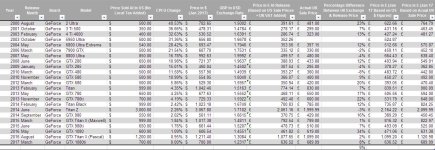Soldato
- Joined
- 25 Sep 2009
- Posts
- 10,006
- Location
- Billericay, UK
They have ignored the Titan completely which is Nvidia's true high end card (excluding dual chip cards) which is skewing the numbers as they practically invented a brand new price point that previously never existed. I know some will argue their geared more towards more then just gaming but that was only the originally Titan and every Titan on release has been marketed toward gamer's.





